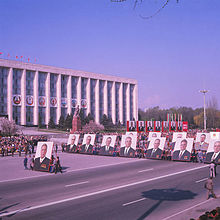Great National Assembly Square, Chișinău
 The Triumphal Arch and Nativity Cathedral on the square. | |
| Native name | Piața Marii Adunări Naționale (Romanian) |
|---|---|
| Former name(s) | Victory Square |
| Type | Square |
| Location | Chișinău, Moldova |
| Other | |
| Known for | The Central Square in Chișinău |
The Great National Assembly Square (Romanian: Piața Marii Adunări Naționale), formerly known as Victory Square (Romanian: Piața Biruinței) is the central square in Chișinău, the capital of Moldova. It is surrounded by the following buildings and monuments:
- Stephen the Great Monument[1]
- Monument to the Victims of the Soviet Occupation
- Government House
- Triumphal Arch
- Nativity Cathedral
- Cathedral Park[2]
History
[edit]In the 19th century, the space of several hundred square meters from the perimeter of the current Stefan cel Mare Avenue. In 1812, became a permanent center for government business. It had the same type of urban planning done in the Russian Empire. At the beginning of the 20th century, many working demonstrations were held here, and after 1924, when the street already bore the name of King Carol II Boulevard, a series of demonstrations and strikes took place on its main square. August 1, 1929, when a one-day political rally was announced. In 1944, the street became a square, with the new authorities naming it Victory Square. In its present form, the square has existed since December 1951.[3] In 1987-1988, it was enlarged by the Soviets after they removed the ruins of the old Eparchial House.[4] In April 2003, the Government of Moldova rejected the request of the Council of Veterans of the Soviet Army to revert the name of the square back to Victory Square. Prime Minister Vasile Tarlev called the proposal a "challenge", adding that the name is inappropriate and that such a decision can only be taken by Chișinău City Hall, which later rejected the veterans proposal.[5]
Massed events
[edit]
Under government legislation, anyone can stage public events in the square with consent from the Chisinau City Hall.[6]
Parades
[edit]During the Soviet Moldovan era, parades were held on this square in honor of the Great October Socialist Revolution, May Day, and Victory Day, until the 1989 Moldovan civil unrest during which the military parade of the Kishinev Garrison in honor of the October Revolution was interrupted by demonstrators.[citation needed] On the morning of 7 November, a group of 100 people took candles and stood in front of Soviet tanks preparing for the parade. Once supporters of the Popular Front of Moldova arrived at Victory Square, the leaders of Communist Party of Moldova left the central stage immediately. The independent Armed Forces of Moldova hosted military parades were dedicated to the independence of Moldova. These parades were held in 2001, 2011, and 2016.
Public demonstrations
[edit]In 1966, Soviet cosmonaut Yuri Gagarin visit the city, attending a mass demonstration on the square. It marked the 500th anniversary of the city's establishment.[7][8] On August 31, 1989, the adoption of the Romanian language as a state language occurred on the square. A 2018 rally supporting the reunification of Moldova and Romania was held on the square.[9] In the run up to the 2020 Moldovan presidential election, an organization affiliated with President Igor Dodon, the Union of Officers of Moldova, occupied the square.[10]
Political activities
[edit]On 15 May 2000, after the Government's initiative to abolish benefits for veterans of the Soviet–Afghan War, sympathizers went to Great National Assembly Square.[11] Protests against President Vladimir Voronin took place on the square during the April 2009 Moldovan parliamentary election protests.[12] Many mass events during the 2015–2016 protests in Moldova took place in the square.[13][14] On 21 May 2023, the European Moldova National Assembly took place in the square.[15]
Gallery
[edit]-
The Triumph Ark and Cathedral at night
-
Leonid Brezhnev and Ivan Bodiul on a grandstand on the square during a parade in 1974.
-
Mass protests in 2016.
-
Protests in 2009
See also
[edit]References
[edit]- ^ Planet, Lonely. "Private Walking Tour of Chisinau in Moldova". Lonely Planet. Retrieved 2017-11-20.
- ^ "Piaţa Marii Adunări Naţionale, 2 – Ansamblul Catedrala Naşterea Domnului". Monument.sit.md (in Romanian). Retrieved 2017-09-10.
- ^ "Историческая справка: кто и когда протестовал на Центральной площади Кишинева". 16 September 2015.
- ^ "Valori europene sau "valori" sovietice în PMAN?".
- ^ "Piaţa Marii Adunări Naţionale din Chişinău nu va redeveni Piaţa Biruinţei".
- ^ "IPN Features". Ipn.md. 8 June 2017. Retrieved 2017-11-20.
- ^ "Фотоархив: космонавт Юрий Гагарин на 500-летии Кишинёва". 9 October 2017.
- ^ "Ю. А. Гагарин на 500-летии Кишинёва (1966 г) | Мой город Кишинёв".
- ^ "Romanian parliament says would back reunification with Moldova". Mobile.reuters.com. 27 March 2018. Retrieved 6 March 2019.
- ^ "Vor să scoată 10 000 în stradă; Uniunea Ofițerilor condusă de Gaiciuc, poliției: "Să fiți gata să asigurați ordinea publică"". JurnalTV.md (in Romanian). Retrieved 2020-11-14.
- ^ "Информация о союзе". Archived from the original on 2021-04-20. Retrieved 2021-02-19.
- ^ Caucaso, Osservatorio Balcani e. "Protests out of control". Osservatorio Balcani e Caucaso (in Italian). Retrieved 2017-09-01.
- ^ "Grand National Assembly has started; Thousands of people protest in center of Chişinău against oligarchic regime". Jurnal.md - Ca să ştii totul!. Retrieved 2017-11-20.
- ^ "Opponents of Moldovan authorities book Chisinau's central square for protests up until Sept. 30 - Sep. 10, 2015". KyivPost. 2015-09-10. Retrieved 2017-11-20.
- ^ Călugăreanu, Vitalie (21 May 2023). "Miting pro-european cu o sută de mii de oameni la Chișinău" (in Romanian). Deutsche Welle.






